![Searching for Graceland]()
by Steve | Sep 15, 2017 | Magazine, Magazine Articles, September/October 2017
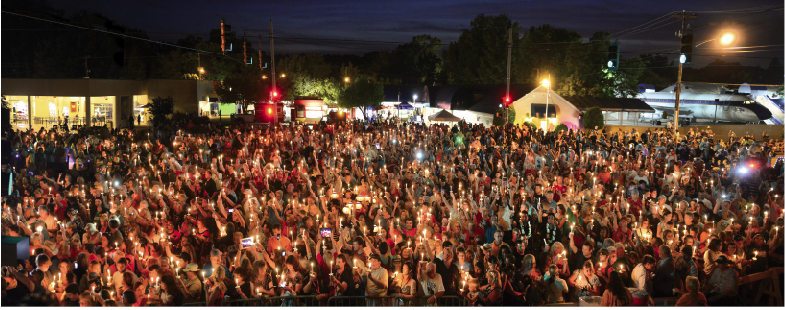
Fans gather at Graceland to commemorate the 40th anniversary of the death of Elvis Presley. Photo courtesy of Graceland.
By Steve Beard-
Forty years after his tragic death, Elvis Presley remains the legendary performer that, as Bob Dylan put it, “crash landed from a burning star onto American soil.” Amazingly, he still enjoys unparalleled worldwide popularity. In August, more than 50,000 showed up on the 40th anniversary of his death to remember the rockabilly superstar. Last year, Graceland injected $137 million into a spectacular expansion in Memphis. Elvis may have left the building, but his fans have not.
Presley is one of the most pivotal and enigmatic pop culture figures in American history. As a young man, he was raised in poverty and southern Pentecostalism. He attended a conservative Assemblies of God church, but would often sneak off to listen to the music and preaching at a black church less than a mile away. Although best known for the swivel of his hips, Elvis loved gospel music and dreamed of singing it professionally. His career launched at Sun Records, however, took him on a different trajectory – the pinnacle of rock ‘n’ roll stardom.
When Elvis rolled into Jacksonville, Florida, on August 10, 1956, Judge Marion Gooding had prepared an arrest warrant for Presley, charging him with impairing the morals of minors in the event that Elvis shook his hips. Young people at the Murray Hill Methodist Church heard Elvis denounced in a sermon titled, “Hotrods, Reefers, and Rock and Roll.” Elsewhere in town, Robert Gray, pastor of Trinity Baptist Church, offered up prayers for Presley’s salvation after declaring that the singer had “achieved a new low in spiritual degeneracy.”
The Rev. Gray gained national notoriety after being featured in Life magazine. Elvis later confessed frustration at the preacher’s actions. “I think that hurt me more than anything else at first. This man was supposed to be a religious leader, yet he acted that way without ever knowing who I was or what I was like,” said Presley. “I believe in the Bible. I believe that all good things come from God…I don’t believe I’d sing the way I do if God hadn’t wanted me to. My voice is God’s will, not mine.”
In the midst of remarkable fame and fortune, he struggled to find his way. After the Easter service at First Assembly of God in Memphis in 1958, Elvis told the Rev. James Hamill, “Pastor, I’m the most miserable young man you’ve ever seen. I’ve got all the money I’ll ever need to spend. I’ve got millions of fans. I’ve got friends. But I’m doing what you taught me not to do, and I’m not doing the things you taught me to do.”
Elvis told his friend Pat Boone, “I wish I could go to church like you.” After Boone told him he could, Elvis replied, “No, they wouldn’t leave me alone. I would distract the minister.” Acknowledging the potential difficulty, Boone told me many years ago that he assured Elvis that “if they see that you are coming for the same reason that they are, all of that would ease away and you could actually worship freely like everybody else. And it would do you a world of good, Elvis.” According to Boone, Elvis “felt like he couldn’t go anywhere in public. So he was sort of imprisoned. I felt like he lived like Public Enemy #1 instead of the King of Rock ‘n’ Roll. It stunted his social and spiritual growth.”
Like so many other young Americans during the 1960s, Elvis explored exotic Eastern religions and experimented with drugs. He was, by all accounts, an eccentric religious seeker on turbo drive. One man who seemed to tap into that spiritual desire was a 24-year-old hairdresser named Larry Geller who told Elvis that he was most interested in discovering three things: “where we come from, why we are here, and where we are going.” This was the key to unlocking Elvis’s attention. “Whoa, whoa, man. Larry, I don’t believe it. I mean, what you’re talking about is what I secretly think about all the time,” said Presley.
Those were the kinds of transcendent questions that haunted Elvis’s soul. He saw through the shallowness of stardom,
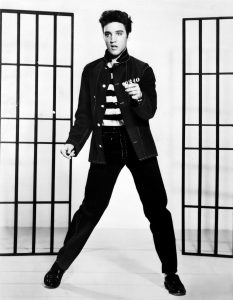
Elvis Presley publicity photo in 1957 for Jailhouse Rock, MGM
but was a prisoner to his own success. In turn, Elvis consumed books on Hinduism, Judaism, numerology, Theosophy, positive thinking, the new-age, and meditation. Although he explored and researched many diverse religions and practices, he never abandoned his faith in Christianity. He was a true believer, but he also had the appetite of a spiritually starved sojourner.
“All I want is to know the truth, to know and experience God,” Elvis said. “I’m a searcher, that’s what I’m all about.”
Throughout Presley’s life, gospel music was the constant element of solace to the man who was burning the candle at both ends. He would spend hours singing gospel with his friends around a piano after his shows. The only Grammy awards he earned were with his gospel records. To many fans, he is as well known for “How Great Thou Art” as he is for “Blue Suede Shoes.”
It was the sequined jumpsuit Vegas years in the 1970s that seemed to drain so much of Elvis’s vibrancy. Presley struggled with womanizing, pill-popping, reclusiveness, and uncontrollable weight gain. He turned to uppers, downers, and painkillers to dull the ache of depression and loneliness. Fame was a wicked mistress and Elvis and his entire entourage knew it. Even then, however, he tried to keep his head above water.
As if to reconnect with his faith, Elvis hired gospel groups such as the Imperials, the Sweet Inspirations, and J.D. Sumner and the Stamps to sing back-up for him while he was in Las Vegas. Surrounded by all of the glittery temptations that Sin City had to offer, Elvis appeared to want to provide a glimpse of the sacred – for his audience or, more importantly, for himself.
It would be a mistake to describe what went on in the Vegas shows as a revival meeting under neon lights. Nevertheless, Presley appeared to be hungering for the security and peace that he found in the faith of his younger years. He was one of the only rock performers who recorded religious music – crossing back and forth over the divide between the secular and the sacred.
Gospel singer J.D. Sumner tells of a woman approaching the stage in Vegas with a crown sitting atop a pillow. “It’s for you,” the woman told Elvis. “You’re the King.” He took her hand, smiled, and told her, “No honey, I’m not the King. Christ is the King. I’m just a singer.”
In December 1976, Elvis requested that the Rev. Rex Humbard (1919-2007), a popular television minister, and his wife Maude Aimee meet with him backstage in Las Vegas in between sets. “Jesus is coming back really soon, isn’t he, Rex?” Elvis said as he began quoting all kinds of Scriptures about the Second Coming. “It really shocked me that Elvis knew all of those Scriptures from the Old and New Testaments about the Lord’s return,” Humbard told me in an interview in 2002.
Elvis, Maude Aimee, Rex, and J.D. Sumner were sequestered into a large closet in order to have some privacy and speak about spiritual matters. “I could see he was reaching back to his childhood when he used to play his guitar and go to church and sing church songs,” recalled Humbard. “And I could see he was reaching back to the past – that spirituality, that feeling that he had years and years before that had been planted in his heart.”
Maude Aimee told Elvis about her prayer that he would fully rededicate his life to God. According to Humbard, “Elvis went all to pieces. He started crying. She shook him up by that statement.” As the four of them held hands and prayed, “he rededicated his heart to the Lord,” recalled Humbard. “I asked God to bless him and to send His spirit into his heart and meet his every need.” During the evening’s second show, Elvis dedicated “How Great Thou Art” to the Humbards.
To be clear, Elvis was dealing with a runaway trainload of emotional, physical, and spiritual issues during his time in Vegas. Elvis was not a saint, and no one knew that better than Presley himself. He was an enigma who touched a spiritual and cultural nerve in American culture. There is, of course, no one else on the planet who can attract more than 50,000 fans to his gravesite to recognize the 40th anniversary of his death. At previous memorial events, fans recited the Lord’s Prayer, repeated the 23rd Psalm, and joined together in singing “How Great Thou Art.”
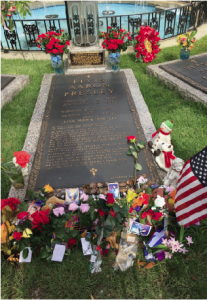
Elvis Presley’s grave at Graceland. Photo by Steve Beard.
When he died, Elvis had fourteen different drugs active in his system. There are plenty of lessons to be gleaned from his tragic death but they should be absorbed through the prism of sorrow, grace, and gratitude. To millions of fans, his life was a spectacular gift – a concoction of rockabilly, gospel, and soul.
At his funeral, the main address was given by the Rev. C.W. Bradley, minister of the Wooddale Church of Christ in Memphis. He spoke of Elvis’s determination, decency, and his love of family. Bradley also acknowledged that Elvis was a “frail human being” and that “he would be the first to admit his weakness. Perhaps because of his rapid rise to fame and fortune he was thrown into temptations that some never experience. Elvis would not want anyone to think that he had no flaws or faults. But now that he’s gone, I find it more helpful to remember his good qualities, and I hope you do too.” His fans – saints and sinners alike – understood that.
The way in which a person dies is not always the best way to remember the pulse of their life. All of us have seasons of our lives that we would sooner forget. It is a worthwhile endeavor to work on extending mercy to others in the same way that we trust the good Lord will extend it to us. We could all use a little trip to “graceland,” even when we are remembering Elvis.
Steve Beard is the editor of Good News. This article is adapted from the original that appeared in Risen Magazine in 2002.

by Steve | Sep 15, 2017 | Magazine, Magazine Articles, September/October 2017
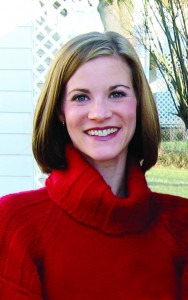
Reed Hoppe
By Reed Hoppe-
How do you find hope in a place like South Sudan?
Dr. Sharon Fogleman, a missionary to South Sudan with TMS Global, asked this question when she addressed our staff one morning. As Christians, we often talk about having our hope in Christ. Yet when your country is enveloped in civil war, your children are starving, and you have been forced to travel a long and dangerous journey to a refugee camp, what does your faith look like? How do you find hope when you have lost everything?
Doctors Lynn and Sharon Fogleman moved to South Sudan in 2012, soon after the country gained independence. Both family physicians, Lynn and Sharon taught a Community Health and Disease Prevention program within The United Methodist Church of South Sudan.
Although violence was a common part of life in this new country, the team resided in Yei, which remained relatively safe. That changed in 2016 when tension between government and rebel forces increased dramatically. “Government soldiers were raping people, looting businesses, burning homes, and killing anyone they found who sided with the rebels,” said Lynn. “The rebels were doing the same thing, so travel beyond our town became very unsafe.”
The Foglemans’ good friend and fellow missionary, Sister Veronica of St. Bahkita Hospital, was killed in May of 2016. A Catholic nun and a physician, she was traveling home by ambulance after taking a patient to the hospital. Soldiers ambushed the ambulance and shot her.
That July, the TMS Global team made the difficult decision to leave Yei. They each packed a small bag and made the dangerous drive to the border, which was closed an hour after they crossed into Uganda. The war has caused more than 1.6 million South Sudanese to leave the country as refugees, and an additional 1.9 million people to be internally displaced. Most have fled to Uganda, where more than 850,000 people are residing in refugee camps, a number which is expected to rise to more than one million by the end of the year.
Many South Sudanese are subsistence farmers who have been unable to tend their crops due to the fighting. The addition of a drought plaguing the area has led to an estimated 100,000 people living in famine, and 40 percent of the population is facing extreme hunger. Aid organizations are desperately trying to get food to people who need it, but the fighting has blocked some areas from receiving aid.
After fleeing South Sudan, the TMS Global team settled in Uganda and is serving in refugee camps on the border. Lynn, Sharon, and Carolyn, a retired nurse, have been joined in Uganda by Nancy, a former hospital CEO and respiratory therapist.
In the camp, TMS Global workers are providing medical care and healthcare education, and are discipling Christians in their faith. Carolyn was recently trained in biblically based trauma counseling in order to minister to residents. She is also training South Sudanese pastors at the camp so that more people can receive counseling.
“Soon after they arrived at the refugee camp, Christians had pulled together and were helping one another,” said Sharon. “Their resilience was amazing. They had set up a compound of tents for the 36 orphans from the children’s homes in Yei and were caring for them. The community radiated hope.
“While we were talking to the children, one of the leaders asked the kids to say what they wanted to be when they grew up. They each stood up with a smile on their face and listed teacher, doctor, driver, mechanic, and other professions. The leaders were not going to let these kids stop dreaming of their future. There we saw hope.
“Although South Sudan is in a very dark place right now, we still see hope. The Christians in South Sudan know that Jesus is their only hope, and that is what they cling to. Join us in praying for peace in South Sudan.”
Reed Hoppe is the associate director of communications for TMS Global – www.TMS-Global.org.

by Steve | Sep 15, 2017 | Magazine, Magazine Articles, September/October 2017
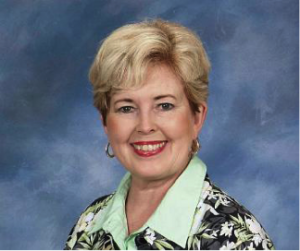 By B.J. Funk-
By B.J. Funk-
My daddy never liked that my friends minimized my double name into initials. Until he went to heaven at the age of 87, he called me Betty Jo unless, since I was the baby, he affectionately called me Baby Jo. He often put me on his knee and told me the story of the Betty Jo Princess. That’s me. I was his princess. His story of me was filled with sweet thoughts, beautiful pictures, and happy endings and was formed by how my daddy viewed me. I wanted to stay in that story forever.
But, then life happened. Young adulthood brought disappointments and difficulties, and the Betty Jo Princess felt the need to hide from life. Climbing back up and shaking myself off, I was ready for the next story. God’s story. That’s where my heart is now, and that’s the story I want to stay in forever. He, too, sees me as His princess. The real story of me is formed by the way my Father views me.
Like me, your story has not turned out exactly as you had planned either. During your up days and down days, every question and every answer did not feel good. Perhaps you felt the need to hide. After some time, you climbed back up, shook yourself off and began the real story of your life. God’s story. That’s the story that balances highs with lows, smiles with tears, and brokenness with strength. No glossing over. No kisses making it all well. No rainbow hunting or sugary hugs. Just a reality that is hard and yet secure, because we all know by now that it’s much better to let life shape you than to hide behind everything we presume is real, only to find out it never was.
In practically every story you read in the Bible, you can find yourself. Let’s take, for instance, the book of Genesis. Walk into the Garden of Eden as God comes down to visit with his children. Are you hiding beside Adam and Eve, hoping God won’t find you because you have disobeyed? Move with Moses as he begins the long desert journey with the Hebrews. When all of the weary travelers begin to grumble because they have not found water, is that you standing close to Moses and grumbling the loudest because things aren’t going your way? When Moses came down with the Ten Commandments, had you given all of your gold jewelry to help make the golden calf you could worship with the others? When did you decide your God is not enough? Seriously?
Watch Joseph’s brothers throw their little brother into a cistern, leave him for dead and then lie to Jacob, deceiving their aging father for years. How long have you held on to a lie in your family? Have you deceived someone who trusted you?
The remarkable and unbelievable part of your walk through Genesis and all of the Bible is that God walks it with you, making a weaving out of the ups and downs of your life, placing love right beside every wrong choice you make. The amazing truth that stands out in your story is that God watched you hide, grumble, deceive, lie, and worship an idol, and he didn’t throw you off the planet because of it. Instead, he tenderly embraced you, loving you through slip-up after slip-up, never condemning you and always reminding you that you are precious in His sight.
You might not always hear His love sounds. He places them inside of us, near our hearts, where they vibrate healing life. You might not always feel his love touches, but they are there. Silently, sweetly, and carefully, he stamps your hand with “Approved” and then waits for you to find out that you really are.
As the story of your life takes the heavy waves that crash against your soul, you will be reminded quite often that you are loved with an unfailing love by an unfailing God. On the days when the tears flow and you don’t understand, God watches closely as you give your tears to him. He doesn’t plan on ever leaving you. If there’s any leaving to do, you’ll have to be the one to do it.
But, why would you? What’s safer on the greener grass of the other side? Only God. Realize today that whatever is happening in your life is the continuation of God’s story for your life. Your story is still unfolding. Seeing your life this way puts a stamp of “Whatever – and Hallelujah” all over your heart.
I choose the story of my life to be God’s story. What about you?

by Steve | Jul 10, 2017 | July-August 2017, Magazine, Magazine Articles

Rev. Rob Renfroe
By Rob Renfroe-
For 50 years, Good News has made a commitment to open dialogue about the divisive issues within The United Methodist Church. These topics include Sunday school curriculum, global ministries, theological pluralism, seminary education, ministry with women, and issues surrounding marriage and sexuality. Our staff and members of our extended supportive network have been faithful partners in most of the major face to face discussions about these issues with boards and agencies, as well the work of the General Conferences and annual conferences.
While we are committed to an evangelical and traditional viewpoint, we have respectfully listened carefully to other viewpoints at dialogue tables. We may not always agree, but we put a high value on engaging the issues and listening to those who do not share our perspective. Nevertheless, it does get wearisome to hear some of the same old arguments as if they are new revelations able to reconcile our differences, change the narrative, or convince those of us on one side of the argument that we’re wrong. Let me give you a few examples.
“It’s about people.” Progressives use this line, many sincerely, to remind traditionalists that our theological perspectives regarding LGBTQ issues impact the lives of real, often vulnerable people. It is something we need to remember. When we talk about homosexuality we must do so with the knowledge that people who may have been mistreated or demeaned because of their sexual attractions are listening. We are committed not to use language that appears to deny their humanity, their worth, or how much God loves them.
Unfortunately, too often the intent of the phrase goes deeper than telling us to be careful with our language. It is used to undercut our theological perspective. In fact, it is sometimes used to tell us that it is wrong to express any belief that makes others uncomfortable or causes them to question their sexual practices or desires. The charge alleges that if we hurt someone’s feelings or cause them to consider whether their sexual practice – heterosexual or homosexual – is outside the will of God, we have done wrong by doing harm to “real people.”
Even if I agree that “it’s about people,” I can still disagree that what is most important about people is how they feel about themselves or how they identify sexually. Our discussion around sexuality does impact the lives of real people – and what’s most important about people is not if they feel good about themselves but if they stand right before God.
One option is presented by those who, in the name of Christ, tell people that they must be true to themselves even if it means engaging in behavior the Scriptures teach to be displeasing to God. The other option says we must take up our cross, deny our sinful desires, and follow Jesus. Which option is more harmful?
As Christians, our first question is not what brings us happiness but what pleases God. Granted, our discussion about sexuality is about people, but ultimately it’s about real people who will stand before a holy God and will either live with or without him for eternity. We will all need grace when that moment comes. But the last thing I want to tell people is that they should continue in sin and presume on the grace of God.
We traditionalists must be very careful with our language and never speak in a way that demeans other human beings, even when we speak about sin and repentance. At the same time, I would appeal to my progressive/revisionist friends not to promote what is contrary to the will of God.
“Why can’t the denomination handle our differences the way we do in my local church?” Pastors who say this mean that their congregation has different opinions regarding marriage and sexual practice and they remain together in love and ministry. Why can’t the UM Church do the same? My response to such pastors is always the same: What would happen in your local church if you or another pastor on your staff performed same-sex weddings in your sanctuary on Saturdays? What would happen in your church if your pastor was married to someone of the same gender? It is safe to assume that some of your people would leave. Others would stop giving. Your congregation could very well become angry, divided, and much less effective in ministry.
Well, that is where the denomination is. We do not just have different opinions, we have different practices. Pastors are marrying gay couples with the approval of their bishops. And annual conferences are knowingly ordaining partnered gay persons even though the Book of Discipline and the Judicial Council say they should not. Progressives believe that traditionalists are denying justice to LGBTQ persons and they cannot live with that. We believe some are promoting sin, denying biblical teaching, and breaking our covenant. And that is why we cannot ignore our differences and act like all is well as your local church does.
Another rhetorical device centrists and progressives use is to ask the question, “Can’t we imagine another way of handling this situation?” Unfortunately, the question is most often asked by those who fancy themselves intellectual, creative, and above the fray. My response? “What have you imagined that solves our problems in a different way?”
For nearly five decades, bright and sincere people on all sides of the issue have tried to think of different ways to resolve our differences regarding marriage and sexuality. Up to this point no one has been able to imagine a solution that has brought us together. Is it possible to imagine another way of solving our division? I guess so. But you do not solve the problem by just asking the question. You solve the problem by coming up with a solution.
What if someone had told Dr. Martin Luther King Jr., “Can’t we imagine a different way of resolving our racial division other than persons of color possessing equal rights?” He surely would have responded, “No, justice is the only solution.” That is exactly how progressives within the UM Church see themselves. They are fighting for justice and equal rights within the church for gay persons wanting to be married and ordained.
Out of respect, the question should be asked of progressives if they can imagine a solution they can live with that does not require gay ordination and gay marriage. My guess is the answer you will receive is a clear and emphatic “no.”
Finally, “We’re better together.” This statement simply does not appreciate the deeply held, sincere beliefs of traditional, orthodox United Methodists. We are seeing faithful members leave the church every day, some after 70 years of being Methodist, because of our division and the rebellion of jurisdictions, annual conferences, bishops, and pastors. But we are pained to be in a church where segments dismiss the Bible as out of touch, promote what the Scriptures teach to be contrary to God’s will, and preach a theology more in sync with Unitarianism than United Methodism. Not all progressives do so, but enough do that we feel our doctrinal core is being undermined. And lay people in the pews are beyond exasperated when they see church funds used by our boards and agencies for a progressive political agenda rather than the Gospel of Jesus Christ.
I have heard clergy colleagues follow up by saying, “Our theological differences make our fellowship richer and deeper.” If that were so self-evident, why have we not joined up with the Calvinists, the Baptists, and those who do not believe in women’s ordination, or infant baptism. “But they’re not like us,” they would respond. The stark differences, however, within our own denomination over scriptural authority, Christology, and sexuality are dramatically highlighting the fact that we are two different churches with the same name.
My wife and I are better together. We are very different. She is artistic and a global thinker. I am more literal and linear. Sometimes those differences create tensions, but we work through them and we come to see the world in a more complete way than we would if we saw it through our own eyes only. But both of us are committed to keeping our marriage covenant. We would not be better together if one of us was cheating on the other and then shaming the other for not agreeing to change our marriage covenant to permit cheating.
What more can be said that has not been said over the past fifty years? We cannot have the same conversation that has failed to move us forward or resolve our differences. “You’re bad and I’m good.” “I’m right and you’re wrong.” “Listen to the stories of LGBTQ people and you’ll change.” “Read the Bible and you’ll admit you’re wrong.” We’ve done that ad nauseum. Isn’t it time for a different conversation, one that begins, “How can we stop fighting and set each other free to pursue what we believe God is calling us to do?”
Rob Renfroe is the president and publisher of Good News.

by Steve | Jul 10, 2017 | July-August 2017, Magazine, Magazine Articles
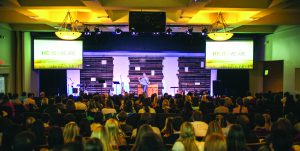
Photo courtesy of The Orchard.
By Walter Fenton-
The largest local church in the Mississippi Annual Conference in terms of worship attendance and one of the 25 fastest growing churches in the U.S. has now officially exited The United Methodist Church. According to lead pastor Bryan Collier, The Orchard Church (Tupelo) reached a settlement with conference leaders that made its departure official as of May 19, 2017.
The congregation agreed to pay 100 percent of its 2017 apportionments and to release the annual conference from all financial and legal liabilities. In turn, the conference has released the congregation from the trust clause. Therefore, The Orchard now has complete and unfettered ownership of its property and assets. (Local UM churches hold their property and assets in trust for the annual conference in which they reside, and would normally have to surrender the property and assets if they decided to leave the denomination.)
“There was just no question among [The Orchard’s] leaders that this was right move for us,” said Collier. “Our departure was not about the homosexuality issue per se, but about the general church’s inability to deal with it. Unfortunately, its failure became an enormous distraction to the kingdom work our congregation is called to do.”
“The Orchard fully embraces, as it does with all people, its need to minister to those who identify as gay, lesbian, bisexual, or transgendered, and with their families and friends as well,” said Collier. “But the denomination was not helping us do that. The Judicial Council’s recent, convoluted decision is emblematic of [the UM Church’s] inability to put the disagreement to rest. We didn’t want to let this one issue distract us anymore. We know the arguments on both sides, we’re clear in our hearts and minds where we stand, and we’re prepared to move forward accordingly.”
The multi-campus church has facilities in Tupelo, Baldwyn, and Oxford, and averages over 2,600 in worship attendance. Collier is the congregation’s founding pastor, and he and the church are celebrating 20 years of ministry together this year.
At the same time, Getwell Road UM Church in Southaven, Mississippi, also gave notice of its plan for an exit. Collier and the Rev. Bill Beavers, Getwell’s senior pastor, characterized their negotiations with Bishop James E. Swanson Sr., the episcopal leader in the Mississippi Area, and other conference officials as peaceful and civil.
Collier noted that there was no good model for a congregation that wants to leave honorably and without rancor, so both parties had to be creative. “Everyone in the process has tried hard to be God honoring,” said Collier. “We’re most appreciative of the tone of the conversation between ourselves and the conference’s leadership. It was peaceful because both sides were committed to making it so.” Getwell exited the denomination on June 4.
The Rev. Victoria White, Director of Connectional Ministries and Communications for the Mississippi Annual Conference, said, “We encourage everyone to keep the congregations at The Orchard and Getwell Road, and the entire Mississippi Annual Conference in their thoughts and prayers.”
Walter Fenton is a United Methodist clergy person and an analyst for Good News.

by Steve | Jul 10, 2017 | July-August 2017, Magazine, Magazine Articles
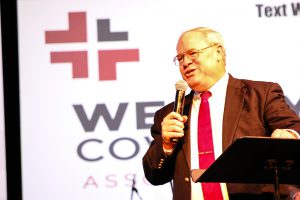
The Rev. Keith Boyette addresses a Wesleyan Covenant Association gathering in Memphis, Tennessee. Photo by Steve Beard.
The Wesleyan Covenant Association (WCA) has named the Rev. Keith Boyette as their first president. Boyette is a member of the Virginia Annual Conference and founded the Wilderness Community United Methodist Church 19 years ago. For eight years, Boyette served on the Judicial Council, known as the “Supreme Court” of The United Methodist Church, and was elected by his peers to serve as secretary of the Council. Prior to responding to God’s call to ordained ministry in the UM Church, Boyette was a practicing attorney in Virginia and Kentucky.
“We are very pleased to have Keith as our first president,” said Dr. Jeff Greenway, the Chair of the Wesleyan Covenant Association Council and pastor of Reynoldsburg (Ohio) United Methodist Church. “He has been an integral member of the team that cast the vision for the WCA from the very beginning and is committed to the renewal of the church. He has vast experience in our denomination, and has demonstrated an ability to relate to a wide variety of people. He embodies our commitment to vibrant, evangelical, orthodox, Wesleyan Christianity, and to renewing the theology and practice of our denomination.”
Boyette most recently served as counsel to Mrs. Dixie Brewster before the Judicial Council in her petition to nullify the election of Bishop Karen Oliveto (page 34).
“I am humbled and excited by the opportunity to begin my service as President of the Wesleyan Covenant Association,” said Boyette. “I have contended for the advancement of evangelical, orthodox, Wesleyan Christianity throughout my adult life. This is a crucial season for those committed to a vibrant expression of the Christian faith that is true to the best of our heritage as we seek the most beneficial outcome for maintaining our beliefs with the approaching Special General Conference in February 2019. I look forward to working with others to ensure that we have deeply committed leadership possessing a fervent passion for the cause of Christ and to connecting churches, clergy, and laity in this endeavor.”
“Building a new organization from the ground up is what Keith does,” said the Rev. Carolyn Moore, the vice-chair of the WCA Council and pastor of Mosaic UM Church in Augusta, Georgia. “He comes to the WCA after 19 years of successfully planting and developing a healthy, creative expression of ‘church’ in Virginia. Having him in the lead as we craft a net wide enough to hold everyone ready to do a new thing is a real grace. I’m grateful to Keith for his willingness to step up and take us into the next Methodism.”
The Wesleyan Covenant Association was formed and their governing Council was elected at a gathering of 1,800 persons last October in Chicago. In its first seven months of existence it has grown to have membership from every Annual and Central Conference in United Methodism. Naming Boyette as president is the next step in the development of this growing organization that is committed to the theological and practical renewal of the UM Church.
Wesleyan Covenant Association press release. Editor’s note: The Rev. Keith Boyette is a former board member of Good News.






 By B.J. Funk-
By B.J. Funk-

